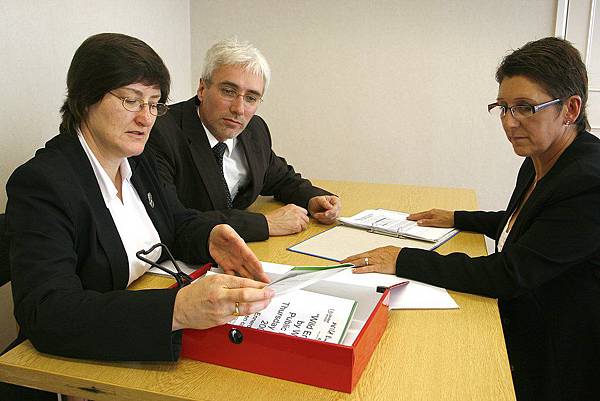當你在面試中表現完美,獲得了這份工作,接下來就是難的這塊了:談薪水。
HR專家Steve Kane 說“談薪水就像是其他任何一種談判一樣,你應該要用有力的語言,因為這是非常個人化的溝通。這種談判並不是某樣物品的價值,而是對企業主來說,你的價值”。

下面是15個說法可能會對你薪水談判有不好的影響:
1. 我接受(第一個offer) "I accept [the first offer]."
記住: 這是一個談判,所以要特別注意不要在還可以繼續之前自己結束了這段對話。(by Ryan Kahn, 職場訓練專家, The Hired Group 創立者, "Hired! The Guide for the Recent Grad 作者."
2. 我想要X "I'm looking for X."
絕對不要提出第一個數字。"你應該要保留談判的空間" (by Lynn Taylor,Tame Your Terrible Office Tyrant: How to Manage Childish Boss Behavior and Thrive in Your Job.作者") Kahn 也同意"一個好的談判策略應該是讓雇主先提出一個數字,如此一來你才可以從這個數字往上去談判。"
3. 你只能提供我這麼少的錢?"That's all you're offering me?"
千萬不要說這句話,或是其他可能讓雇主不舒服的話,就算他提出的薪水低得可笑。
4. 不 "No."
"在談判的過程,你應該要保持彈性,或是在談判中沒被提到的條件中提出你的需求" Kahn 說明,”直接拒絕會導致你可能直接失去了接者談下去的機會”
5. 我有其他更吸引人的offer
"I have other outstanding offers right now that are much more lucrative."
就算你的確有別的好offer, 你還是不應該用這張牌來說服你的雇主。Tayloe 說”你在談判中應該只談你們手頭上的案子。”
而且如果你其實沒有別的offer, 那千萬不要用這個伎倆。”你有可能砸到自己的腳。雇主可能會要你細談你別的offer而你卻在吹牛,很丟臉”
6. 我的底線是…"Bottom line"/"This is my final/last offer."
這句話聽起來像是威脅,通常是談判的最後一句話。Kane說”如果你提出你的底線,而雇主又不答應的話,談判又已經結束,那麼你只有走人了”
7. 我知道我聽起來咄咄逼人,不過….
"I know this may sound a little aggressive, but..."
如果你說的事情是事實的話,那你根本不應該覺得自己說的話太咄咄逼人
8. 我需要…"I need..."
你絕對不應該說你為了某項開支或是債務所以需要XX金額,Taylor 說”不要把個人因素放進來,這個協商只有跟你的價值與這份工作有關係”
9. 我討厭必須問這個問題,不過….."I hate to have to ask for this, but..."
的確,談錢的確不容易。不過說你”討厭必須問這問題”實在太假了。而且這種說法實在是在談判中很糟的開頭。
10. 我覺得…."I think..."
不要用”我覺得”或是”也許、或是其他”不確定性的文字” Jessica Miller-Merrell是” Blogging4Jobs.com 的編輯與Xceptional的HR建議 "絕對要聽起來很有自信”
11. 我最低可以接受的是X…."The least I'd be willing to accept is X."
如果你告訴他們一個你最低可以接受的數字,那這大概也就是你會得到的薪水了。
12. 不好意思 "Sorry"
對自己要有信心。Kahn說”如果你知道自己的價值所在,知道自己將給公司帶來些什麼,那你對於要求更高的薪水根本沒什麼好抱歉的。
13. 廉價/爛 "Cheap"/"Lousy"
這些字眼對雇主來說是非常不尊重的。Kane解釋到” 因為你不尊重對方的態度,雇主甚至可能會決定最後不僱用你。”
14. 可是我比這數字更值得 "But I'm worth so much more."
你當然會想要在薪水協商中,提出你的價值,但是試者不要讓自己聽起來太自大。
15. 你可能不覺得我值得,但是…."You might not think I'm worth this, but…"
就是不要這麼說。
Miller-Merrel 總結的說: “薪水協商時你要聽起來直接明瞭、有禮貌,這樣才能表現你的競爭優勢與對團隊的價值性”
JL碎念:
希望對你們有幫助…談薪水對JL來說真的是難爆了
原文在這裡: http://goo.gl/cgbDO1
You secured the interview, brought your A game, and landed the job. Now comes the hard part: negotiating your salary.
"Salary negotiations are like any other type of negotiations — except the words you use can be extremely powerful, since there is a personal aspect to the discussion," says HR expert Steve Kane. "The negotiation is not over the worth and price of an inanimate object, but rather the value of you to some enterprise."
Here are 15 words and phrases that may hurt more than they'll help in a salary negotiation:
"I accept [the first offer]."
Remember: This is a negotiation, so be careful not to end it before it has even had a chance to start, says Ryan Kahn, a career coach, founder of The Hired Group, and author of "Hired! The Guide for the Recent Grad."
"I'm looking for X."
Never throw out the first number. "You want to leave room for discussion," says Lynn Taylor, author of "Tame Your Terrible Office Tyrant: How to Manage Childish Boss Behavior and Thrive in Your Job."
Kahn agrees. "A good negotiation strategy is to let the employer offer the first number. That puts you in a position to see the number they are offering and gives you the opportunity to negotiate it up from there."
"That's all you're offering me?"
Never say this, or anything else that will offend the employer — even if you think the salary they're offering is laughable.
"No."
"In negotiations, you'll have to be willing to be flexible and provide counteroffers when the offer isn't in line with what you are seeking," says Kahn. By saying "no" you could be quickly closing the door on the offer at hand.
"I have other outstanding offers right now that are much more lucrative."
Even if it's true, you shouldn't use "that card" to pressure the employer, Taylor says. "Only discuss the offer at hand."
And if you don't have another offer on the table, you'll definitely want to avoid this tactic. "You could shoot yourself in the foot," Taylor says. "The hiring manager may ask you to elaborate and if you're bluffing, it'll be hard to save face."
"Bottom line"/"This is my final/last offer."
These phrases sounds like threats, and they typically close out the negotiation, says Kane. "If you say any of these things, and the demand is not met by the employer, the negotiation will be over and you'll have to be prepared to walk away."
"I know this may sound a little aggressive, but..."
If your rationale is based on fact, you should never have to preface your request with this type of disclaimer.
"I need..."
You should never say you need X amount more because of expenses or debt. "Don't bring in personal issues; this is about your merit and the job fit," says Taylor.
"I hate to have to ask for this, but..."
True, it might not be the easiest thing to ask for more money — but saying you "hate to have to do it" is a flat out lie. Plus, it's just a really terrible way to preface the negotiation.
"I think..."
Don't use "I think" or "maybe" or any other "uncertain words," says Jessica Miller-Merrell, editor of Blogging4Jobs.com and CEO of Xceptional HR. "Always speak confidently."
"The least I'd be willing to accept is X."
If you tell them the parameters of the lowest offer your willing to take, that could be what you'll get.
"Sorry"
Have confidence in yourself. "If you know your value and what you'll be bringing to the company, there will be no need to apologize for asking for more," Kahn says.
"Cheap"/"Lousy"
These words are demeaning or disrespectful to the employer, Kane explains. "The employer may decide they don't want you to work there after all because of the lack of respect you show them."
"But I'm worth so much more."
Of course you'll want to mention your value in a salary negotiation — but try to say it in a way that isn't so obnoxious. You never want to come off as arrogant.
"You might not think I'm worth this, but…"
Just don't.
"You want to be direct, polite, and concise in your negotiation to show that you are competent and a valued member of the team," Miller-Merrell concludes.
